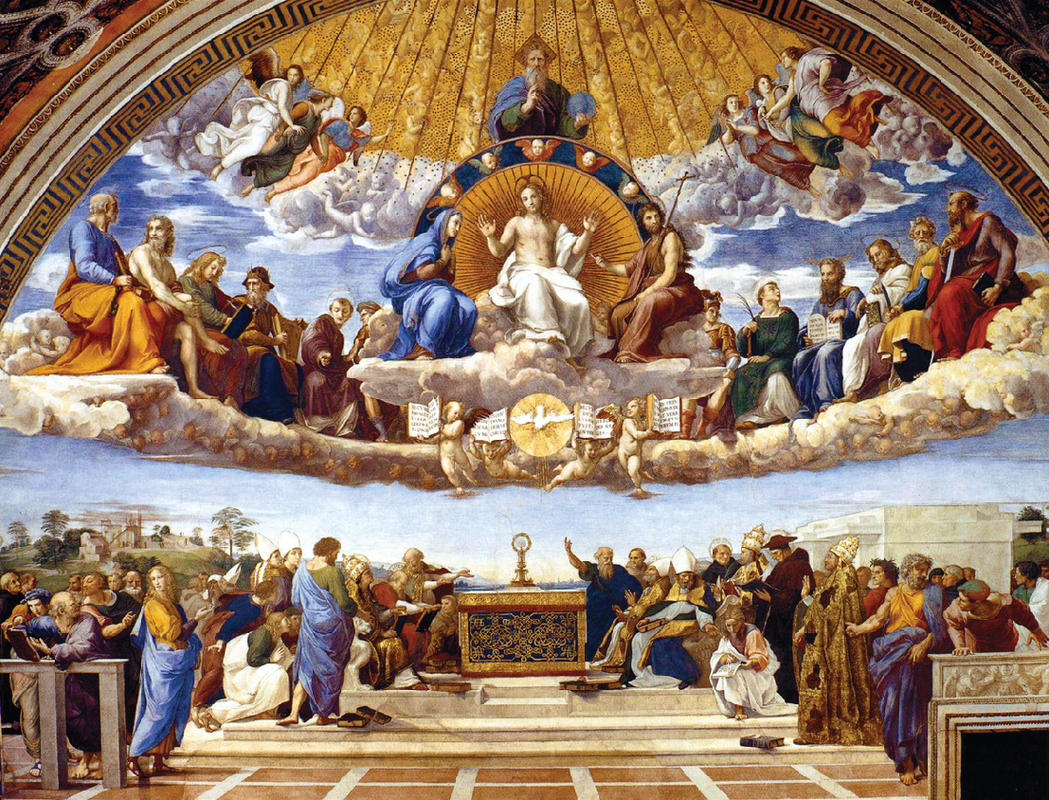
Then you will have glory in the presence of those who sit at the table with you. For whoever exalts himself will be humbled, and he who humbles himself will be exalted.
To be exalted is to have glory. The glory we give to the name of the Lord, then, is due to its exalted status. The connection between the Lord’s name and His glory is a tenet of the liturgy and has deep roots in Scripture. “Glory be to the Father and to the Son and to the Holy Spirit.”
This fulfills the prophecy of Psalm 102: “So the nations shall fear the name of the LORD, And all the kings of the earth Your glory.”
For those who are looking for “Where does the Bible say we have to…?” bases for liturgical elements, we have this: “Declare His glory among the nations.” Doing the Gloria Patri in gentile lands is not an option, I guess.
Here are some other verses:
From Psalm 29: “Give unto the LORD the glory due to His name; Worship the LORD in the beauty of holiness.” Evidently there is a beauty to worship.
From Psalm 148: “Let them praise the name of the LORD, For His name alone is exalted; His glory is above the earth and heaven.”
And here is a passage from Isaiah 42, one of the chapters about the Lord’s Servant (Jesus). The passage nicely brings several themes together from our Gospel for this week: “I, the LORD, have called You in righteousness, And will hold Your hand; I will keep You and give You as a covenant to the people, As a light to the Gentiles, To open blind eyes, To bring out prisoners from the prison, Those who sit in darkness from the prison house. I am the LORD, that is My name; And My glory I will not give to another, …”
This passage is about Jesus. We know this because previously it describes the “Elect Servant” saying, “A bruised reed He will not break, And smoking flax He will not quench.” This is one of the prophecies used to demonstrate that Jesus is not a revolutionary.
So, Jesus is the one called in righteousness. Indeed, for His baptism fulfilled all righteousness; to hunger and thirst for righteousness is to hunger and thirst for Him; to seek first God’s kingdom and His righteousness is to seek Christ as well.
The Lord will hold Christ’s hand. Indeed, for even as Jesus just taught, who would not go down into a pit to save that which has fallen into it on the Sabbath? And when did Jesus “fall” into the pit, joining man in his fall, but on the Sabbath? The Holy Spirit, so to speak, took His hand and raised Him up.
And then, Jesus Himself became the “firstborn” of a new creation, and He Himself became a light to the Gentiles in a dark place, in the pit. He brought out prisoners from the prison, the prison house of Sheol and Hades. Jesus will lift them up, just as He taught. He will exalt those humbled in the pit.
But then, look what it says, “His glory He will not give to another.” This seems to contradict what Jesus promised of those who are exalted, namely, that “you will have glory in the presence of those who sit at the table with you.” It seems this is exactly what God will do, that is, share His glory with us. How do we make these ends meet?
We begin with Psalm 115, a Psalm about idols, which begins, “Not unto us, O LORD, not unto us, But to Your name give glory.” The Psalm lays the foundation for something we’ve been meditating on, that idols are merely projections of human desire wed to material things. As it says, “Their idols are silver and gold, The work of men’s hands. …Those who make them are like them; So is everyone who trusts in them.”
So, to claim glory for self is really the original sin, the idolatry of the forbidden fruit, whose esteem in the mind of Eve was amplified by her Satan-triggered desire. “I can be like God!” The proper confession is, “Not unto us!”
But yet, again, to them that begin with this premise, God indeed will “give” or at least “share” His glory, just as Jesus teaches. God will not share His glory with us on our terms, as we play our games of self-projected idolatry. But to them that confess, “Not unto us!” He will share His glory with them.
This is the picture we get from Revelation. On one hand the twenty-four elders, representing Jews and Gentiles brought together in Christ, sit on thrones. As Jesus promises, “To him who overcomes I will grant to sit with Me on My throne, as I also overcame and sat down with My Father on His throne.” We share His glory.
On the other hand, the twenty-four elders throw down their crowns before the Lamb, symbolizing the confession, “Not unto us!” That visionary idiom marks the Christian life. Humble, but exalted.
Back to the liturgy, which puts this visionary idiom into formal practice. A big part of the liturgy is doing exactly that, saying, “Not unto us!” We confess our sins. We beg for mercy. We ascribe glory to the Triune God. We confess a God who does all the action, and in which we are passively acted upon. Truly, “Not unto us!”
But then what happens? We are drawn “up” to the altar, to the table of the Lord. And then what? “Then you will have glory in the presence of those who sit at the table with you.”